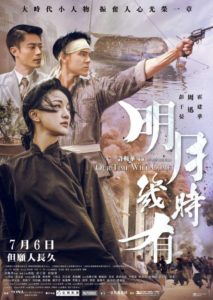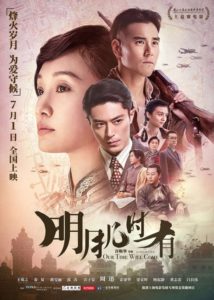Our Time Will Come
明月几时有
China/Hong Kong, 2017, colour/b&w, 2.35:1, 131 mins.
Director: Xu Anhua 许鞍华 [Ann Hui].
Rating: 6/10.
Actress Zhou Xun anchors an otherwise clunkily written and staged WW2 resistance drama.
Hong Kong, Dec 41. With the British colony under attack by the Japanese, the guerrilla East River Column 东江纵队, under Zeng Sheng (Lv Liangwei) has been tasked by the CPC’s Southern Bureau with secretly evacuating a number of intellectuals out of Hong Kong. The actual process starts in early 1942 and lasts six months. Among the evacuees is the famous Mainland writer Mao Dun (Guo Tao) who has been renting a room with his wife (Jiang Wenli) from widow Mrs. Fang (Ye Dexian). Fang’s headstrong young daughter, Fang Lan (Zhou Xun), 24, is a primary-school teacher whose longtime boyfriend Li Jinrong (Huo Jianhua) is also a teacher. His school has just been closed. He proposes marriage to Fang Lan but she puts him off; he then reveals he’s leaving to take a job in the Mainland. The escape of Mao Dun, his wife and their friend, Shanghai journalist Zou Taofen (Huang Zhizhong), is handled by East River Column guerrilla Liu Jinjin, aka Heizai (Peng Yuyan), a buccaneering sharpshooter who’s in the Firearms Unit.  By accident, Fang Lan, who idolises Mao Dun’s writing, ends up helping him escape when the operation almost goes wrong. In summer 1942 Heizai is almost caught transporting weapons by a Chinese spy (Xiong Xinxin), whom he shoots. Meanwhile, Li Jinrong is actually still in Hong Kong, working at the HQ of the Japanese military/secret police, the kenpeitai 宪兵队, as a double agent, a job that involves socialising with the Japanese. His boss, Yamaguchi (Nagase Masatoshi), is a fan of Chinese poetry. Ignorant of Li Jinrong’s true whereabouts, Fang Lan continues life at home with her mother. After Heizai assassinates turncoat army captain Xiao (Wu Dairong) at a dinner of his supporters, he visits Fang Lan and recruits her into the East River Column’s Urban Unit, a new intelligence section, carrying messages and distributing anti-Japanese propaganda. One of her contacts is a herbalist doctor, Wu (Pan Fangfang). Between going about family duties, including attending the wedding of a female cousin, Fang Lan recruits one of her former primary school pupils, Zheng Jiabin, into a unit of children carrying messages. She then decides to leave home and work fulltime for the resistance. In 1944, now head of the Urban Unit, Fang Lan again meets Zheng Jiabin, who’s now an experienced member of the underground. However, when her mother takes it upon herself to pick up a secret message from Wu, she’s caught by the kenpeitai. Fang Lan is tipped off by Li Jinrong that her mother is temporarily being held at the kenpeitai‘s HQ, and Heizai plans a rapid rescue mission.
By accident, Fang Lan, who idolises Mao Dun’s writing, ends up helping him escape when the operation almost goes wrong. In summer 1942 Heizai is almost caught transporting weapons by a Chinese spy (Xiong Xinxin), whom he shoots. Meanwhile, Li Jinrong is actually still in Hong Kong, working at the HQ of the Japanese military/secret police, the kenpeitai 宪兵队, as a double agent, a job that involves socialising with the Japanese. His boss, Yamaguchi (Nagase Masatoshi), is a fan of Chinese poetry. Ignorant of Li Jinrong’s true whereabouts, Fang Lan continues life at home with her mother. After Heizai assassinates turncoat army captain Xiao (Wu Dairong) at a dinner of his supporters, he visits Fang Lan and recruits her into the East River Column’s Urban Unit, a new intelligence section, carrying messages and distributing anti-Japanese propaganda. One of her contacts is a herbalist doctor, Wu (Pan Fangfang). Between going about family duties, including attending the wedding of a female cousin, Fang Lan recruits one of her former primary school pupils, Zheng Jiabin, into a unit of children carrying messages. She then decides to leave home and work fulltime for the resistance. In 1944, now head of the Urban Unit, Fang Lan again meets Zheng Jiabin, who’s now an experienced member of the underground. However, when her mother takes it upon herself to pick up a secret message from Wu, she’s caught by the kenpeitai. Fang Lan is tipped off by Li Jinrong that her mother is temporarily being held at the kenpeitai‘s HQ, and Heizai plans a rapid rescue mission.
REVIEW
A WW2 resistance drama, initially centred on the 1942 overland evacuation of intellectuals from Japanese-occupied Hong Kong, Our Time Will Come 明月几时有 isn’t much different from many other Mainland war movies – except that nowadays many of them are better written and staged than this one. Noticeably short on spectacle (the main conflict seems to be happening somewhere off screen), clunkily written (few scenes rise above straight exposition) and equally clunkily staged (well-laundered clothes, a filmy look), it marks a further decline in the career of Hong Kong director Xu Anhua 许鞍华 [Ann Hui] following her uninvolving period biopic of Mainland writer Xiao Hong, The Golden Era 黄金时代 (2014). Just to underline the theme of cross-border ties, the film was released in the Mainland on the exact 20th anniversary of Hong Kong’s handover. Though it outperformed Golden Era‘s meh RMB52 million, it hardly set the box office alight, grossing only RMB62 million, a weedy amount considering its heavy promotion and name cast.
In a long career across four decades, Xu, 70, appears to have peaked with A Simple Life 桃姐 (2011), the moving story of a Hong Kong amah’s final lap that drew memorable chemistry from veterans Ye Dexian 叶德娴 [Deanie Ip] and Liu Dehua 刘德华 [Andy Lau]. (For an essentially small Hong Kong film it grossed a respectable RMB70 million in the Mainland.) Maybe reflecting her roots in TV documentary, Xu has always been more comfortable with contemporary, more intimate films with strong social or emotional undercurrents rather than period, costume or genre movies, especially those on a bigger canvas. Coming on the heels of The Golden Era, Our Time simply underlines the fact.
Xu’s only period film to have really worked, Love in a Fallen City 倾城之恋 (1984), set just before the events in Our Time, owed a lot to the casting and to some great chemistry between leads Zhou Runfa 周润发 [Chow Yun-fat] and Miao Qianren 缪骞人 [Cora Miao]. In Our Time, however, there’s often a complete deficit of chemistry where it’s needed, notably between Mainland actress Zhou Xun 周迅 and her two male co-stars, both from Taiwan – the wooden Huo Jianhua 霍建华 as her boyfriend and the boyish Peng Yuyan 彭于晏 [Eddie Peng] as a buccaneering guerrilla. Huo, 37, is as inexpressive as ever – Taiwan’s equivalent of Gu Tianle 古天乐 [Louis Koo] – while Peng, 35, plays the young guerrilla as if the whole war is one big merry jape. His performance, which lacks any kind of heft or heroism, diminishes the film whenever he’s on screen.
Playing 20 years younger than her real age, and pretty much bringing it off, Zhou, 42, gives a masterclass in minimal acting, and singlehandedly earns the film an extra point. She’s mesmerising, whether reciting an excerpt from Mao Dun’s works opposite the great writer himself (slyly played by Mainland comedian Guo Tao 郭涛); politely demurring to jump into marriage for her boyfriend’s convenience; or quietly putting up with the pushiness of her mother (beautifully played by Ye, here in very different mode from her role in A Simple Life).
As director, Xu must bear much of the blame for the film’s shortcomings. But equally to blame is the bumpy script, by Mainland-born, Hong Kong-based veteran He Jiping 何冀平 (Flying Swords of Dragon Gate 龙门飞甲, 2011), that lurches from one sequence to another with no sense of dramatic continuity or overall architecture – or at least in the cut by Hong Kong-born Canadian editor Xue Meilian 雪美莲 [Mary Stephen] (Blind Mountain 盲山, 2007; Judge 透析, 2009; The Drunkard 酒徒, 2010). There are signs here and there that the film was cut down from a much longer version. Whatever the reason for the bumpiness, He still relies on cliched characters in her script, from the Chinese-poetry-loving Japanese villain to the mother who sacrifices herself for a cause.
The first half hour is almost a film-within-a-film, largely devoted to a real-life operation – proposed by the CPC’s Southern Bureau in Dec 1941 and carried out by the Guangdong People’s Anti-Japanese Guerrilla Group (of which the East River Column 东江纵队 was a part) – to spirit celebrities and international sympathisers out of the territory and over to the Mainland. In six months some 800 people were brought to safety – as a caption notes at the end of the opening 30 minutes. The story of the evacuation could easily have been a whole movie, and all of the most affecting scenes come from this section. After it, the film has difficulty discovering a similar sense of purpose: it continues with the politicisation of Zhou’s character as she becomes involved in the resistance, but it also introduces a younger recruit whose story never develops into a central role but is tagged with modern-day interviews with the boy as an old man. Processed in b&w, they’re a major distraction – even more by featuring a major star, Hong Kong’s Liang Jiahui 梁家辉 [Tony Leung Ka-fai] – and further add to the film’s lack of focus.
Visual spectacle has never been Xu’s strong point but it’s more noticeable than ever in Our Time, a story that would seem to cry out for some – or at least a sense of scope and accomplishment to parallel the film’s English title. Instead, it has a cramped, modestly budgeted feel, opened up occasionally by a typically warm score from Japan’s Joe Hisaishi 久石让 but given no consistent visual signature by Hong Kong’s Yu Liwei 余力为 (A Simple Life), normally an adaptable d.p. who can do arty or commercial.
If Our Time has a strangely non-Hong Kong look, even for a period film, that’s because it was shot in Guangdong province. The Chinese title (roughly, “When will the bright moon appear?”) is the famous opening line of the so-called Water Song by Song dynasty poet Su Dongpo 苏东坡, aka Su Shi 苏轼, which is academically discussed in one scene between Huo’s double agent and the Japanese secret-police chief.
CREDITS
Presented by Shanghai Bona Cultural Media (CN), Bona Entertainment (HK). Produced by Shanghai Bona Cultural Media (CN).
Script: He Jiping. Photography: Yu Liwei. Editing: Xue Meilian [Mary Stephen]. Editing advice: Kuang Zhiliang. Music: Joe Hisaishi. Art direction: Wen Nianzhong [Man Lim-chung]. Costume design: Chen Wanli [Polly Chan]. Sound: Du Duzhi. Action: Dong Wei.
Cast: Zhou Xun (Fang Lan/Kong Xiufang), Peng Yuyan [Eddie Peng] (Liu Jinjin/Heizai/Blackie), Huo Jianhua (Li Jinrong), Ye Dexian [Deanie Ip] (Fang Lan’s mother), Guo Tao (Mao Dun), Nagase Masatoshi (Yamaguchi Mamoru, colonel, security bureau head), Bao Qijing [Paw Hee-ching] (Fang Lan’s aunt), Huang Zhizhong (Zou Taofen), Jiang Wenli (Mao Dun’s wife), Liang Jiahui [Tony Leung Ka-fai] (old Zheng Jiabin), Chun Xia (Fang Lan’s cousin), Wang Wanzhi (Si), Lv Liangwei [Ray Lui] (Zeng Sheng, guerrilla leader), Li Canchen [Sam Lee] (security agent), Zhang Zhaohui [Eddie Cheung] (Qiu, security colonel), Feng Cuifan [Stanley Fung] (village chief), Yuan Qiongdan (wedding chaperone), Tang Ning (Fang Lan’s cousin), Wu Dairong (Xiao, traitorous army captain), Pan Fangfang (Wu, herbal doctor), Lu Qiaoyin (underground worker at _kenpeitai_), Jiang Zuman (guerrilla), Liang Wendao (Liang Shuming), Cai Hanyi (Wendan, young guerrilla), Morita Suzuka (Matsuko), Huang Xiuping (Xia Yan), Xiong Xinxin (roadside spy), Xu Anhua [Ann Hui] (interviewer of old Zheng Jiabin).
Premiere: Shanghai Film Festival (Competition), 18 Jun 2017.
Release: China, 1 Jul 2017; Hong Kong, 6 Jul 2017.
